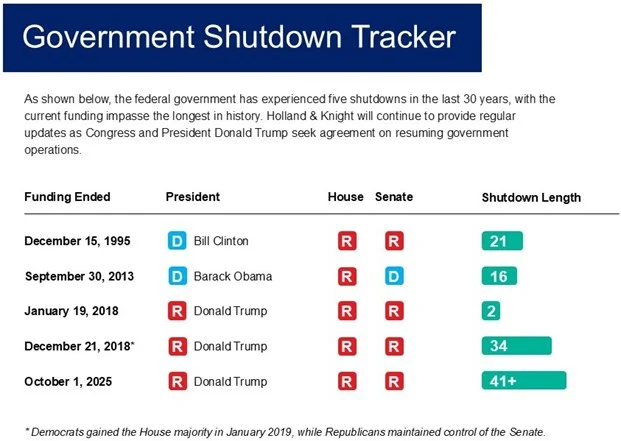- within Government and Public Sector topic(s)
- within Compliance topic(s)
Welcome to the Eyes on Washington: Shutdown Briefing. During the federal government shutdown, we will be sharing concise, client-focused updates to help you stay informed on key developments, legislative dynamics and potential impacts to your operations and federal engagement.
Breaking News
U.S. senators invoked cloture on the motion to proceed with the continuing resolution (CR), 60-40, setting in motion a potential end to the shutdown. Senate Majority Leader John Thune (R-S.D.) will offer an amendment in the nature of a substitute that reflects the agreement reached between Republicans and a number of Democratic senators. The agreement funds the U.S. Department of Agriculture (USDA), as well as the U.S. Food and Drug Administration (FDA), U.S. Department of Veterans Affairs (VA) and military construction projects, and congressional operations for the full fiscal year while extending other agencies until January 30, 2026. The measure also guarantees backpay for federal workers, restores employment of workers subject to reductions in force (RIFs) during the shutdown and prevents RIFs through January 30, 2026.
The measure must still pass the U.S. House of Representatives to reopen the government. Separately, as part of the agreement to end the shutdown, Thune has promised Senate Democrats that a vote to extend Affordable Care Act (ACA) subsidies will occur in December 2025. House Speaker Mike Johnson (R-La.) said he will not commit to bringing the subsidies up in the House.
Status Update
Today marks Day 41 of the federal government shutdown. Negotiations on reopening the government are ongoing after the movement in the Senate mentioned above.
Congressional Activity
- Democratic Leadership: As of November 9, seven Senate Democrats and one Independent crossed party lines to invoke cloture on the motion to proceed with the CR, 60-40, to end the shutdown. The eight members are Sens. Tim Kaine (D-Va.), Catherine Cortez Masto (D-Nev.), John Fetterman (D-Pa.), Maggie Hassan (D-N.H.), Dick Durbin (D-Ill.), Jacky Rosen (D-N.V.), Jeanne Shaheen (D-N.H.) and Angus King (I-Maine).
- Republican Leadership: Republican leadership seems cautiously optimistic that the government could reopen as soon as this week. Senate Majority Leader Thune is working to reach a time agreement to vote on final passage as soon as possible. House Speaker Johnson has encouraged members to return to the U.S. Capitol soon, though he has not provided the official 36-hour notice to members yet.
- Bipartisan Engagement: The Senate is holding votes on the CR, cloture and nominations, and the House is convening on a pro forma basis. It is expected that Democrat votes could be necessary in the House as well.
Executive Branch Developments
- Air Travel: Last week, the Federal Aviation Administration (FAA) mandated that airlines cut flights by 10 percent across the country's largest airports as the government shutdown continues. U.S. Department of Transportation Secretary Sean Duffy warned that if the shutdown does not end soon, cuts could rise to 20 percent. Even after the government reopens, flight delays may linger.
- Troop Pay: Even though service members were paid on October 31, U.S. Department of the Treasury Secretary Scott Bessent said it's doubtful that service members will receive pay on November 15, unless the shutdown ends.
- Supplemental Nutrition Assistance Program (SNAP): On November 7, the Trump Administration asked a federal appeals court to block a judge's order mandating that it provide full SNAP benefits for the month of November. The Supreme Court temporarily issued a stay on the order, allowing the Trump Administration to withhold $4 billion in payments for the SNAP program. USDA then issued a directive instructing states to undo any steps they took to issue full SNAP benefits for November. States should instead issue partial benefits.
Key Milestones
- November 15: Military payday
- November 17: Senate staff are projected to miss their third full paycheck.
- November 28: House staff are expected to miss their second full paycheck. Members of Congress continue to be paid.
- December 5: Non-exempt federal employees will have worked two months without pay.
Strategic Considerations for Clients
- Agency Engagement: Clients should anticipate delays in regulatory reviews, permitting and federal communications.
- Contracting and Grants: Federal contractors may experience payment disruptions and limited access to agency personnel.
- Policy Positioning: The shutdown may create new leverage points in legislative negotiations. Clients with interests in appropriations, healthcare, defense and infrastructure should monitor developments closely.

The content of this article is intended to provide a general guide to the subject matter. Specialist advice should be sought about your specific circumstances.






